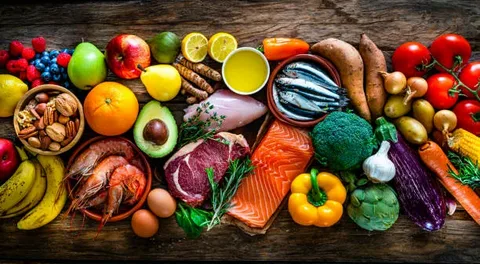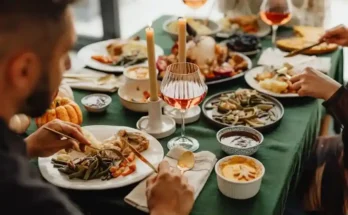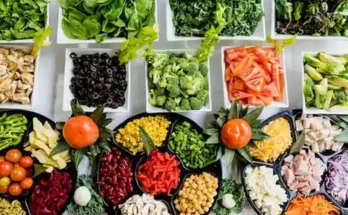Food is not just something we eat to stay alive. It’s memory, identity, emotion, connection. It’s a conversation passed down through generations, whispered in spice, stirred in soup, and folded into dough. Every bite tells a story — of where we come from, who raised us, and what we believe in.
From quiet breakfasts with our parents to feasts shared during festivals, food shapes our daily lives and our biggest moments. It nourishes not just our bodies but our spirits too. In every culture, cuisine is a love language — and often, the most powerful one.
Yet in modern times, with fast food chains on every corner and microwave meals becoming the norm, our relationship with food has begun to fray. Somewhere between convenience and craving, we’ve forgotten the quiet dignity food deserves.
Food as a Form of Respect:
-
Gratitude Begins at the Table
When we pause before a meal — even if just for a breath — we acknowledge that food is a gift. Whether it’s a bowl of rice or a gourmet entrée, each dish carries the weight of labor, land, and time. Farmers planted and harvested. Cooks stirred and seasoned. The earth itself gave its bounty.
Respect for food begins with this awareness. It’s not about guilt; it’s about gratitude. When we throw away leftovers, over-order, or waste ingredients mindlessly, we aren’t just discarding food — we’re disregarding the work and life behind it.
Cultures across the globe have rituals for honoring food: Japanese people say Itadakimasu before eating, an expression of appreciation. In India, food is considered sacred, often offered to deities before being consumed. These customs remind us: food is not a product. It is presence.
-
Eating with Intention
Respecting food also means eating it with intention. Savoring flavors instead of inhaling them. Listening to our hunger rather than numbing emotions with snacks. When we eat mindfully, we’re in conversation with ourselves — asking, what do I truly need?
Mindful eating isn’t a diet. It’s a return. A return to trust in our bodies, to joy in eating, and to the slow, beautiful art of being nourished — not just fed.
The Power of Food in Culture and Identity:
-
A Taste of Home
For many, food is a passport to memory. The smell of cinnamon might take someone back to their grandmother’s kitchen. The first bite of warm naan may transport another to a bustling street market in Delhi.
Cuisine is how we stay connected to our roots. Immigrants carry it with them across oceans. Families preserve it through handwritten recipes and holiday meals. Even when languages are forgotten or traditions lost, food often survives.
To respect food is also to respect culture — to understand that dishes are not just flavors, but legacies.
-
Breaking Bread Together
Food has a way of softening boundaries. Enemies have made peace over shared meals. Strangers have become friends through exchanged recipes. Across religions, borders, and ideologies, the act of breaking bread remains one of the simplest, yet most profound, ways to unite.
We all need to eat. But when we do so together, food becomes something more: a bridge.
A Necessary Distinction:
-
Healthy Food
Healthy food fuels the body without burdening it. It provides essential nutrients, supports immunity, energizes, and uplifts. Whole fruits and vegetables, lean proteins, whole grains, and good fats work in harmony with the body’s needs.
But healthy food is more than kale and quinoa. It’s about balance. It includes cultural staples, comforting homemade dishes, and seasonal, local ingredients. Healthy eating honors tradition without compromising well-being.
It’s also deeply personal. What’s healthy for one body may not suit another. It’s not about rigid rules — it’s about mindful nourishment.
-
The Trap of Unhealthy Food
Unhealthy food, often ultra-processed, may please the tongue in the short term but offers little long-term value. High in sugar, salt, and synthetic additives, such food creates cycles of craving, inflammation, and fatigue.
Fast food, sugary beverages, packaged snacks — these are not inherently evil. But when they dominate our diet, they dull our senses and disconnect us from our bodies. They transform eating from an act of self-love into an act of self-neglect.
The real danger isn’t in the occasional indulgence. It’s in the normalization of food that doesn’t love us back.
Rebuilding Our Relationship with Food:
-
Cooking as Ceremony
When you cook — even something simple — you become part of the journey from earth to plate. There’s a quiet ritual in chopping vegetables, the sizzle of oil, the steam rising from a pot. Cooking reawakens respect. It reminds us that food is not just bought — it’s built.
Home-cooked meals are a rebellion against rushed eating. They are a statement: I am worth the time it takes to nourish myself.
-
Listening to Our Bodies
The body is incredibly wise. It tells us when it’s hungry, when it’s full, when it needs greens or rest or water. But in the chaos of modern life, we’ve stopped listening.
Reconnecting with our natural hunger cues and understanding emotional vs. physical hunger is essential to healing our relationship with food. It’s not about discipline. It’s about dialogue — with the one person we eat with every day: ourselves.
A Global Issue with Personal Solutions:
Globally, one-third of all food produced is wasted — enough to feed billions. In homes, restaurants, and supermarkets, perfectly edible food ends up in landfills while many go hungry.
Food waste is not just a logistical issue. It’s an ethical one. It calls us to re-examine how we shop, store, and consume. Respect for food means respecting the resources — water, labor, fuel — that brought it to our table.
Small changes — using leftovers creatively, planning meals, sharing surplus — can ripple into significant impact. Composting instead of tossing. Supporting local farmers instead of distant supply chains.
Food is not infinite. But our ability to treat it with care can be.
Conclusion:
At its core, food is more than sustenance. It is the rhythm of our days, the flavor of our heritage, the pause that punctuates our hustle. It’s something to be cherished, not just consumed.
By respecting food — understanding its roots, choosing it with care, preparing it with love, and eating it with awareness — we not only improve our health, but we uplift our spirit.
The next time you sit down to eat, listen. To the aroma, to the texture, to the silence between bites. Let it remind you of something we’ve always known but often forget: food is life — not in metaphor, but in truth.




